County Board Wrangles Over Budget Process
Washtenaw County board of commissioners meeting (May 1, 2013): The location and accessibility of a planned May 16 budget retreat drew some heated rhetoric from commissioner Ronnie Peterson, who argued strongly for all budget-related meetings to be held in the main county boardroom and to be televised, as the board’s regular meetings are.
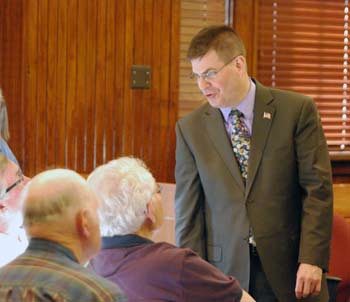
Washtenaw County commissioner Dan Smith (R-District 2) talks with residents who attended the county board’s May 1 meeting to highlight the deteriorating condition of North Territorial Road, which runs through Smith’s district. (Photos by the writer.)
The May 16 retreat is set for the county’s Learning Resource Center at 4135 Washtenaw Ave. – near the county jail complex – starting at 6 p.m. The meeting is open to the public and will be videotaped.
Peterson also questioned the content of the retreat. “If it’s a hug fest,” he said, “I don’t have to be there.” Board chair Yousef Rabhi told commissioners that the goal will be to set priorities for the upcoming budget. “It’s going to be work,” Rabhi said. “There aren’t going to be any hugs, unless somebody wants to give me a hug.”
Also at the May 1 meeting, the board gave final approval to authorize the development of a four-year budget planning cycle, a change from the current two-year cycle that’s been in place since 1994. The vote was 7-2 vote, with dissent from Peterson and Rolland Sizemore Jr. Peterson argued that developing a budget is the main job for commissioners. “So we owe the taxpayers a rebate. I hope we cut our salaries in half … because there’s really a lot less work to do.” Though the planning cycle would be longer, the board is still required by state law to approve its budget annually – so that process wouldn’t change.
The board will get a better sense of the county’s financial status at its May 15 meeting, when county administrator Verna McDaniel will give a first-quarter update and a “state-of-the-county” presentation. One major factor is a pending decision for the board on whether to issue a $345 million bond to cover the county’s pension and retiree healthcare obligations. The board discussed that topic at a May 2 working session. [See Chronicle coverage: "County Board Debates $350M Bond Proposal."]
One item not on the May 1 agenda was raised during public commentary: The deteriorating condition of North Territorial Road, specifically a section running through Northfield and Salem townships. Residents have collected about 600 signatures on a petition urging the road commission to repair that stretch, and asked the county board to help address the problem “before somebody gets hurt or comes in here shouting or raving.”
County commissioner Dan Smith, who represents the district that includes Northfield and Salem townships, pointed out that there are possible funding mechanisms available to the county, including the possibility of levying a tax under Act 283 of 1909. A 1 mill levy in Washtenaw County would bring in about $13.8 million, based on 2012 property values, he said. He also noted that there’s a similar law on the books that appears to allow townships in Michigan to levy up to 3 mills for roads. That could bring in another $24.9 million throughout the county, he said. In total, about $38 million could be raised in Washtenaw County to fix the roads.
In other action during the May 1 meeting, commissioners gave initial approval to the Washtenaw Urban County‘s five-year strategic plan through 2018 and its 2013-14 annual plan.
The board also declared May 12-18, 2013 as Police and Correction Officers Week, and May 15 as Peace Officers Memorial Day. Dieter Heren, police services commander with the Washtenaw County sheriff’s office, was on hand to accept the resolution on behalf of sheriff Jerry Clayton and all law enforcement agencies in the county. He reminded the board that on May 15 at 10 a.m. there will be a memorial service in the Washtenaw 100 Park in Ypsilanti to “honor the law enforcement officers who have fallen here in Washtenaw County while serving the community,” he said. The park is located at the corner of Michigan Avenue and Ballard Street.
North Territorial Road
Several residents addressed the board to express concern about the deteriorating condition of North Territorial Road. The portions of most concern on the east-west road – located north of Ann Arbor – run through the townships of Northfield and Salem, east of US-23.
Bob Hlavacek told commissioners that he wanted to highlight the condition of North Territorial Road. People have been complaining about it for four or five years. They’ve talked to the county road commission and several county commissioners, he said, but the answer is that the county has no funds for repairing the road. “It’s no longer a waiting situation,” he said. “There’s patch upon patch, and there’s potholes that show up between the patches.” An untold amount of expense has been caused from vehicle damage, including damage to tires, rims and alignments.
People drive over the center line, dodging back and forth to avoid some of the roughest spots, Hlavacek said. The Northfield Township police aren’t happy about it. It would be very easy to lose control of a vehicle. Hlavacek said he and others have circulated a petition online and in person, and have about 600 signatures from people who are concerned about the road. The petition highlights the need to fix North Territorial between Spencer Road and Ridge Road.
Some of the people who signed the petition also made comments. Hlavacek said he wasn’t sure about the validity of the comments, but he wanted to pass them along. Specifically, some people think the lack of road repair is retribution for protests against a road commission proposal to put a facility at North Territorial and Earhart.
Bill Harley told commissioners that he and others have tried to understand the funding priorities of the county and state. There were people who had wanted to rally around this issue a couple of years ago, he said, but some people had argued that because the economy was bad and everyone was suffering, it was better to wait. North Territorial is a multi-community road, he noted, going west of the US-23 corridor and east to Plymouth and beyond. “It is not even close to being a road,” he said. It’s so bad that it’s causing road rage. Harley said he travels North Territorial multiple times a day, and had to replace the front end of his Ford truck for $1,300.
Harley told commissioners that he and others were at the county board meeting to beg for help. He noted that a roundabout was being built at 7-Mile and Pontiac Trail, which is needed “like a hole in the head.” And as bad off as Wayne County is, last year that county paved North Territorial up to the border with Washtenaw. “But Washtenaw has done absolutely nothing,” Harley said. “It looks like the priority for North Territorial Road is misunderstood.” He noted that advocates for the road repair have gathered 600 signatures without even canvassing neighborhoods, and he wanted to know what they should do with those signatures. He asked if there was anything that the county board could do, or anything else he and other residents can do “before somebody gets hurt or comes in here shouting or raving.”
Harley added that “we’ll do anything that’s positive.” Hlavacek asked whether it would be possible to get on the board’s agenda for a more formal discussion.
Arlene DeForest spoke on the same topic. She said she was from Salem Township and was representing the Washtenaw County Farm Bureau. North Territorial is one of the few roads that goes straight east and west, she noted, and when there’s a problem on the expressway, North Territorial is the alternative route. “We’re going to have some deaths pretty soon” because of the road condition, she said. DeForest likened the condition to a track at the General Motors proving grounds, where bad terrain is used to test vehicles. The road is narrow with no shoulder. She urged commissioners to drive the road and see for themselves.
North Territorial Road: Commissioner Response
Conan Smith thanked the speakers for raising this issue, saying he was certain the road’s condition didn’t reflect retribution by the road commission. He joked that it’s probably retribution for electing Dan Smith to the board. [Smith, a Republican, represents District 2, which includes Northfield and Salem townships. He and Conan Smith are not related.] C. Smith noted that the county board doesn’t have jurisdiction over the roads – that’s in the hands of the road commission. The road commission has a prioritization process for capital improvements, and he suggested that the residents talk to engineers at the road commission who could explain that process.
The prioritization process includes scoring the condition of local roads. The worst road in the county is at 9, C. Smith said. North Territorial is scored at 8, “so it’s already pretty high on their list of priorities for repair.” One of the problems is the expense, he noted. The road commission already has plans to spend about $9.5 million on North Territorial improvements, but most of that money isn’t secured yet, he noted. “I know that they’re keenly aware of the problem, and they’re seeking the additional state and federal funds that they need to do a reconstruct on that road.” This year, the road commission does plan to do about $300,000 worth of repairs on North Territorial, he added.
C. Smith said the county board can let the road commission know that citizens are concerned.
Rolland Sizemore Jr., the county board’s liaison to the road commission, said he agreed that North Territorial is in bad shape. There’s a road in his district that’s in bad shape too. It’s all about the money, Sizemore said. He noted that one option would be for the township to levy a special assessment on property owners to raise money for the repairs. Sizemore told the residents that he’d be glad to work with them, but they weren’t the only ones with road problems in the county.
Dan Smith thanked the residents for making the trip to speak to the board. He’d heard these comments before, and reminded commissioners that he had raised this issue at the board’s March 7, 2013 budget retreat. Some new options have been provided by the state legislature, he noted, in terms of management and funding. “We haven’t really explored either of those options in detail yet,” he added.
D. Smith also pointed to an option that the board discussed but didn’t pursue a couple of years ago – an Act 283 levy for road funding. [See Chronicle coverage: "County Board Poised to Reject Road Millage."] He noted that the board could choose to bring that forward again.
The road commission has made public a map that shows sections of roads in the county that would get attention if state funding is made available, D. Smith said – including three problematic sections of North Territorial, east of US-23. But no one knows if or when that funding might be available. Reconstructing a road that’s beyond repair is very expensive, compared to spending funds on maintenance, he said, so the road commission is trying to make sure roads that are in fair condition don’t deteriorate even more. “Unfortunately, it means a segment like North Territorial, which needs major repair, doesn’t get any attention.”
Andy LaBarre encouraged the residents also to contact their state representative and state senator. There are many proposals in Lansing, but nothing has been decided, he said. Input like this would be helpful. [Northfield and Salem townships are part of District 52 in the state house, represented by Rep. Gretchen Driskell. In the state senate, the area is part of District 18, represented by Sen. Rebekah Warren, who is married to Washtenaw County commissioner Conan Smith.]
Ronnie Peterson noted that the residents had asked specifically about how to proceed. Peterson asked the county administration to contact the road commission and request that a specific discussion take place about North Territorial. Residents are relying on county commissioners to be advocates for them on this issue, he said, so there should be a meeting on it. The county commissioners are elected by the people, and have the responsibility of appointing the road commissioners, Peterson noted.
Dan Smith suggested the Whitmore Lake High School theater as a suitable venue for a public meeting in that part of the county.
County administrator Verna McDaniel said she’d follow up with the board’s liaison to the road commission, Rolland Sizemore Jr. Sizemore stated that he’d call the road commission “first thing in the morning.”
Conan Smith noted that in Gov. Rick Snyder’s proposed funding for roads statewide, the amount for Washtenaw County includes funding for North Territorial that would cover about half of the cost for the project. That funding has not yet been approved, however. “So the more you can reach out to Lansing folks as part of your advocacy effort, the better,” he said.
Later in the meeting, Dan Smith brought up the issue of Act 283 again, saying “I don’t think this horse is anywhere near dead.” He read from Act 283 of 1909: “It shall be the duty of the board of supervisors to raise a sufficient tax to keep any county roads or bridges already built in reasonable repair and in a condition reasonably safe and fit for public travel.” He said he didn’t want to interpret what each of those words mean, but the general meaning seems pretty clear to him – that the county might have a mandate and might have the funds to execute that mandate.
Over the past two years, D. Smith said, he’s asked residents specifically about this possible tax levy. One of the common responses he’s heard is that if the county does the job right, people still won’t like the tax but they “won’t hate it as much.” People are frustrated when they see road repairs that clearly won’t last long, he said. “People see that as throwing good money after bad.”
A 1 mill levy in Washtenaw County would bring in about $13.8 million, based on 2012 property values, D. Smith said. He also noted that there’s a similar law on the books that appears to allow townships in Michigan to levy up to 3 mills for roads. That would bring in another $24.9 million throughout the county, he said. In total, about $38 million could be raised in Washtenaw County to fix the roads. Making a rough estimate of what these taxes could bring statewide, he said the amount that could total about $800 million.
Sizemore responded, saying he didn’t agree that there should be a countywide millage for road repair. He said he felt the same way about last year’s effort by the Ann Arbor Transportation Authority to create a countywide public transit system. He’s willing to work with the road commission and residents to address the roads, but he’s not willing to support a millage. He indicated that one factor was the uncertainty of other possible millages, like one that might be proposed for the new southeast Michigan regional transit authority.
Outcome: This was not a voting item.
County Budget
Two items on the board’s May 1 agenda related to the next county budget, for the period beginning Jan. 1, 2014: (1) setting a board retreat for May 16; and (2) taking a final vote to authorize the development of a four-year budget.
County Budget: Updates & Retreat
Felicia Brabec, chair of the board’s ways & means committee, reported that she would be giving regular updates on the budget development at each meeting. She said that she and board chair Yousef Rabhi attend the bi-weekly budget task force meetings, as well as other budget-related meetings. The finance staff has scheduled its first round of meetings with all county departments, with second rounds as needed, Brabec reported. And county administrator Verna McDaniel will be presenting a first-quarter financial update to the board on May 15, as well as a “state-of-the-county” report.
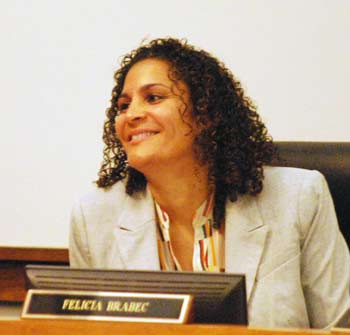
Felicia Brabec (D-District 4) is chair of the board’s ways & means committee, on which all commissioners serve.
Brabec noted that the board would be voting later that night on developing a four-year budget, and that on May 2 the board would be briefed on a bond proposal to fund the county’s pension and retiree healthcare liabilities. [See Chronicle coverage: "County Board Debates $350M Bond Proposal."]
Rather than the normal working session on May 16, the board would be holding another budget retreat. This one will be located at the county Learning Resource Center (LRC), 4135 Washtenaw Ave. – near the county jail complex.
Ronnie Peterson expressed concern about the location. He felt that all meetings – especially related to the budget – should be televised and held in the board chambers, so that the public can know where commissioners stand in terms of priorities and funding. It’s especially crucial if the county moves toward a four-year budget planning cycle, he said, adding that he had concerns about that process, too. [The board holds its regular meetings in the boardroom of the county administration building at 220 N. Main in downtown Ann Arbor.]
Conan Smith responded to Peterson, saying that he struggles “in this room, to have the kind of conversation with all of you – with my peers – that lets me get to that prioritization process.” Smith said he’s been a big advocate for getting out of the boardroom to have that conversation, but he’s torn on this issue. He wants the board as a team to work in a productive space, while at the same time giving the public access to those conversations. It might be doable to televise the retreat at the LRC, he said, noting that late last year, the interview process for appointments to the southeast Michigan regional transit authority had been held at the LRC and were videotaped.
C. Smith felt that the retreat was an opportunity for the board leadership to hear the views of other commissioners, but that the formal budget conversation would happen during a regular meeting in the boardroom.
Board chair Yousef Rabhi said it wasn’t his intention to take the retreat off camera or off the record. He stressed that the board is “always on the record.” The meetings are open to the public, and minutes are taken. The May 16 retreat is at a location that’s on a bus route, he noted, so that it’s more easily accessible. The point of having it at a different location is to “create a different environment for dialogue.” He said they were going above and beyond the requirements of the Open Meetings Act, but he was willing to explore options for recording the retreat – perhaps with audio or video recordings.
Greg Dill, the county’s infrastructure management director, reminded commissioners that when the boardroom had been renovated several years ago, meetings were held in the LRC and had been televised. So that capability exists, he said.
Rolland Sizemore Jr. didn’t think the previous retreat format had worked well. “You guys probably have the votes to do the [four-year] budget and you guys have probably got the votes to go out and get the $350 million [bond] that you guys plan on doing, so I’m not inclined to go anywhere where we’re not on camera … I think the public deserves to know what goes on.”
Sizemore also wondered why the retreat wasn’t being held at SPARK East in Ypsilanti. Rabhi replied that the LRC was chosen because it’s the largest county facility – other than the boardroom in the downtown administration building – that could handle a larger crowd. He said he wasn’t opposed to exploring other locations.
Peterson said it was important to outline what would happen at the May 16 retreat. “If it’s a hug fest, I don’t have to be there.” If the meeting is about setting county priorities, then he’d be interested in it. He also stated that if the meeting isn’t televised, he wouldn’t attend – he said he’s been very consistent about that. Meetings shouldn’t be held “in the shadows,” especially in discussing a budget that extends beyond the commissioners’ terms in office. [County commissioners are elected for two-year terms. The proposed budget planning cycle would extend for four years.]
Peterson also noted the magnitude of the possible $350 million bond proposal, saying the public should be fully informed about that.
Andy LaBarre pointed out that the board would be discussing the bond proposal at the May 2 working session, and he suggested that comments and questions about that would be best saved until then.
Replying to Peterson, Rabhi said he wanted to be “crystal clear – we do not do business in the shadows. We do business in the public eye.” Minutes are taken, the press and public are invited, and most meetings are on camera, he noted. Rabhi said he’s never served on any other board that has held its retreat in a boardroom. Retreats are typically held in other locations “to facilitate the retreat environment,” he said. The county board has also held previous retreats that weren’t televised, he noted. Even so, Rabhi said he’s willing to work with staff and commissioners to find a way to record the retreat proceedings above and beyond the requirements of the Open Meetings Act. The openness of meetings is a priority of his and of the board, Rabhi said.
Rabhi added that the retreat is not focused on the question of bonding. That discussion would happen at the May 2 working session, he said, as well as at upcoming board meetings. All of that will be televised, he said.
The retreat on May 16, Rabhi said, “will not be a love fest. It will not be a pat-on-the-back occasion.” It will be a chance for the board to delve into its general priorities for the budget. The last retreat generated a lot of ideas, he said. Now, the board needs to take those ideas and weight their priorities. “It’s going to be work,” Rabhi said. “There aren’t going to be any hugs, unless somebody wants to give me a hug.”
He said he appreciated Peterson’s request to hold the retreat on camera, and that they can explore the possibility. However, he added, “I think that it’s unfair to me for you to continue to harp on this, when I have already committed to you that we are going to be looking into this. I just feel that it’s inappropriate. You didn’t mention my name, but you are directing it at me, and I feel that it’s inappropriate. I need to say that on record.”
Rabhi said he hoped the retreat could help the board work with administration to set a budget that reflects the board’s priorities. It’s especially important since the administration will be developing a four-year budget, he said.
Peterson replied that he tried not to direct his comments to anyone personally. But when someone directs a comment to him personally, they can “expect a personal comment back,” he said. He wondered whether there was a document that laid out the content of the May 16 retreat. Brabec responded, saying there wasn’t a written document yet for the retreat.
Peterson stated that when things are done outside of the boardroom, “it puts a shadow over it.” He said no one has been anointed to run things. “All of us are equal at this table as commissioners,” he added. Documents should be equally shared with all commissioners, he said.
Regarding the issue of appropriateness, Peterson said, “I will bring up any item I deem is appropriate, as a commissioner representing my respective district, no matter what anybody thinks.” He said he knows some people are trying to guide this process. “Forget about guiding,” he said. “Just do your job that you’re elected to do as commissioner. There’s no minority at this table.” Apparently directing his comments to Rabhi as board chair, Peterson said: “You’re only elected by your colleagues to serve in the capacity that you serve.”
Peterson also said that the bond proposal is part of the budget, so he would be talking about that throughout the budget process. “You’ll hear me talk about a lot of the issues that are important to me as a commissioner – no matter who likes it.”
County Budget: Setting the Retreat Date
Later in the evening, Rabhi put forward a resolution that canceled the May 16 working session and set the budget retreat for that date instead, to be held at the LRC. When Sizemore asked if the retreat would be televised, Rabhi replied that the intent is to make sure there would be some kind of recording. Sizemore repeated the question: “Is this going to be on video or not?”
At that point, Rabhi suggested taking a straw poll of commissioners on this issue. LaBarre said that if it’s possible to videotape the retreat, that would be great. But if it can’t be videotaped, he felt the board should still proceed with the retreat, making every effort to comply with the Open Meetings Act and the spirit of transparency.
Other commissioners indicated agreement to videotaping the retreat. Rabhi said they’d go ahead and videotape it.
Alicia Ping suggested adding the LRC’s address to the resolution setting the retreat. She noted that not everyone knows where the facility is located. Rabhi suggested putting the bus route on the public meeting notice as well. [AATA's Route #4 goes past the LRC at 4135 Washtenaw Ave.]
Peterson reiterated his position that all budget-related meetings should be held in the boardroom.
Outcome: The board voted to cancel the May 16 working session and set a budget retreat for that date instead at the Learning Resource Center, 4135 Washtenaw Ave., starting at 6 p.m. Voting against the resolution were Ronnie Peterson and Dan Smith. Rolland Sizemore Jr. was out of the room during the vote.
After the vote, Rabhi stated that he wants to make sure everyone feels this is a collaborative environment, where everyone can share their thoughts and feelings about the process and about the way business is being done. He apologized if commissioners felt that he had reacted inappropriately to comments that were made during the meeting. He welcomed people to share their thoughts and concerns, “whether we agree or not.” He thanked commissioners for their work, and for sharing their values and the values of the people they represented.
County Budget: Four-Year Cycle
On the May 1 agenda was a resolution authorizing the development of a four-year budget planning cycle, a change from the current two-year cycle that’s been in place since 1994. The board had taken an initial vote on the issue at its meeting on April 17, 2013, with Ronnie Peterson dissenting and Rolland Sizemore Jr. absent.
The board had been briefed on the issue at a Feb. 21, 2013 working session. County administrator Verna McDaniel has cited several benefits to a longer budget planning cycle, saying it would provide more stability and allow the county to intervene earlier in potential deficit situations. [.pdf of McDaniel's Feb. 21 presentation] State law requires that the board approve the county’s budget annually, but a quadrennial budget would allow the administration to work from a longer-term plan.
With a two-year approach, larger cuts must be made within a shorter timeframe to address anticipated deficits. McDaniel has argued that a four-year plan would allow the administration to identify potential deficits at an earlier date, and target savings that would compound over the longer period, making the overall budget more manageable. Currently, the budget is being developed for 2014-2017.
Commissioners have noted that this approval provides direction to develop a four-year budget plan, but at any time the board can decide to revert to the previous two-year cycle. One of the main concerns mentioned by commissioners, including Peterson, is the fact a four-year budget cycle doesn’t synch with the two-year election cycle for terms on the board.
During the May 1 meeting, Dan Smith said he wanted to be perfectly clear that the board is simply allowing the process to move forward. He was reserving judgment about whether the final budget that’s produced should be adopted. “I’m certainly not saying that by voting on this [resolution] that I’ll be voting for a four-year budget.” But it’s good to continue exploring the possibility, he said. There are some good things about it, though he continues to have some serious concerns.
Sizemore asked for clarification about the timeline. McDaniel said the ultimate deadline for approving the budget is Dec. 31, so it would need to happen by the board’s last meeting in December. She plans to bring the budget forward much sooner than that, however, saying “the earlier, the better.” The process starts by meeting with the different departments in the county, she said, and the board will be updated along the way. At the board’s May 15 meeting, McDaniel will be giving an update on the county’s current financial situation for the first quarter through March, to set the stage for crafting the budget.
Sizemore said he hoped the budget wouldn’t be rushed through initial and final approval during the same meeting. He felt that this was happening too often with other items that come before the board.
Yousef Rabhi emphasized that even though the budget would be prepared for a four-year period, the board is evaluating the county’s financial condition on a quarterly basis. “We’re taking a far look down the road, but we’re also making sure that we benchmark the progress that we’re making.” He said he’d gotten some feedback that indicates people aren’t sure what the four-year budget is intended to do. People have concerns about how the board can adjust for changes that happen over the four-year period, such as fluctuations in tax revenues, he said. Rabhi indicated that there are ways the board will be able to make adjustments.
McDaniel also noted that a budget reaffirmation is required every year, and the board would have the opportunity to make changes at that point.
Peterson highlighted the fact that the four-year budget wasn’t a projection or strategic plan – it would be a budget, and the only way to change it would be by a majority vote of the board. McDaniel replied that the board has authority to review or change the process at any time.
Peterson pointed out that this would be the first time in the county’s history that a four-year budget would be developed. He didn’t know of any other municipality or government that used this approach. The projections could be off, he noted, especially because of changes in state or federal funding. Anything could happen in the gubernatorial or presidential election, and priorities could change. New technology will also result in changes to the government, he said. “I’m going to vote against this, because I don’t see how you can project that far out.”
Peterson said his view isn’t a reflection of the administration or finance staff – they’re just carrying out the wishes of the board, he noted. The board has responsibility to set the county’s priorities, but with a four-year budget, most of that responsibility will be gone. “So we owe the taxpayers a rebate. I hope we cut our salaries in half … because there’s really a lot less work to do.” The budget is the county board’s main task, he said, other than accepting the annual equalization report and making appointments to various boards and commissions.
Peterson contended that it would be difficult to modify a four-year budget. As an example, he noted that the emergency allocation from the county in response to last year’s tornado touchdown in the Dexter area would be more difficult to do, if there were a four-year budget in place. “With a four-year budget, that flexibility is not there,” Peterson said. Other unforeseen needs might include overtime for police services, technology infrastructure, or court costs. He hoped that the board would discuss the impact of a four-year budget with department heads and other elected officials. [The county board sets the budget for all county departments, including those led by elected officials: The sheriff, prosecuting attorney, treasurer, clerk/register of deeds, and water resources commissioner.]
Peterson said he wasn’t trying to make this a hostile discussion about the budget, but he didn’t see how it would be possible to develop a four-year budget.
Sizemore said he echoed Peterson’s concerns. He noted that the circuit court is asking for $2 million for a software update. “That just comes out of the blue, and I don’t know how we’re going to handle things like that if we have a four-year budget,” he said. The district court is over budget, he added: How will things like that be predicted, and where will the money come from to address it?
Alicia Ping clarified that the resolution in front of commissioners that night was authorizing the administration to develop a four-year budget. The board wasn’t voting on the budget itself, she noted.
Sizemore responded, asking why the board would tell the administration to develop a four-year budget if there weren’t already the votes to support adopting a four-year budget? That would be a waste of staff time, he said. Sizemore added that he wouldn’t support it. The vote is premature and the issue needs to be explored more before moving ahead.
Outcome: Commissioners gave final approval to develop a four-year budget on a 7-2 vote. Dissenting were Ronnie Peterson and Rolland Sizemore Jr.
Urban County Strategic Plan
Washtenaw Urban County‘s five-year strategic plan through 2018 and its 2013-14 annual plan were on the May 1 agenda for initial approval. [.pdf of draft strategic and annual plans]
The Urban County is a consortium of Washtenaw County and 18 local municipalities that receive federal funding for low-income neighborhoods. Members include the cities of Ann Arbor, Ypsilanti and Saline, and 15 townships. “Urban County” is a designation of the U.S. Dept. of Housing and Urban Development (HUD), identifying a county with more than 200,000 people. With that designation, individual governments within the Urban County can become members, entitling them to an allotment of funding through a variety of HUD programs. The Urban County is supported by the staff of Washtenaw County’s office of community & economic development (OCED).
Two HUD programs – the Community Development Block Grant and HOME Investment Partnership – are the primary funding sources for Urban County projects.
The plans indicate that the Urban County area is expected to receive about $2.7 million annually in federal funding, which will be used for these broad goals:
1. Increasing quality, affordable homeownership opportunities
2. Increasing quality, affordable rental housing
3. Improving public facilities and infrastructure
4. Supporting homeless prevention and rapid re‐housing services
5. Promoting access to public services and resources
6. Enhancing economic development activities
A public hearing had been held at the board’s April 17, 2013 meeting.
Urban County Strategic Plan: Board Discussion
Conan Smith asked about whether there is any integration between the Urban County strategic plan, and the strategic planning of other county operations, such as the workforce development or community action boards.
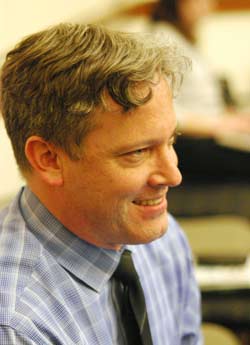
Brett Lenart, housing and infrastructure manager for the county’s office of community & economic development.
Brett Lenart, housing and infrastructure manager for the county’s office of community & economic development (OCED), said the best example of that integration is related to human services. A lot of the funding that the county gets for human services is administered through this process, he said. The strategic plan itself is fairly formulaic and general, following HUD’s requirements. But it’s integrated in terms of the synergy of activities, he said.
Lenart added that the next phase of OCED’s development as a department is to look for more intersections between economic development and workforce development. Human services and affordable housing have always been strongly linked, he noted, and going forward the OCED will look for more strongly integrating the other areas, too.
C. Smith said it might be interesting to “tease out” of this plan the relevant sections related to other citizen boards – the workforce development board and community action board – and to have a short presentation to each of those boards about the Urban County initiatives. He noted that integrating these areas was one of the reasons why the county merged the office of community development with the economic development and energy department.
Ronnie Peterson asked whether the Urban County budget would be coming before the board later this year. County administrator Verna McDaniel replied that this Urban County budget is for the fiscal year starting July 1, 2013, “so I believe this is it.”
Peterson then expressed concern that the commissioners weren’t getting more time to review this budget. Lenart explained that it’s a five-year plan that identifies general categories of work, but OCED will bring forward specific projects within those categories each year. The five-year plan gives an estimate of the total anticipated federal allocation during that period. The more detailed budget is for only one year, starting July 1. He noted that this is the Urban County’s third five-year plan.
Peterson said he’d support the resolution on its initial vote that night, but he would have additional questions when it came for a final vote on May 15.
Felicia Brabec noted that HUD’s priorities are changing. Are those changes reflected in the Urban County’s plans? Generally speaking, Lenart replied, the OCED has set up a framework that will allow it to do the work it has traditionally done with this federal funding. If HUD’s priorities and funding levels change, then OCED would look at the scope of its programs and how those programs are prioritized in the face of decreasing revenues.
Alicia Ping said she supported the Urban County “110 percent.” Six of the 10 municipalities that she represents in District 3 are part of the Urban County, which makes those communities eligible for federal funding that they wouldn’t otherwise be able to receive. She was glad that OCED director Mary Jo Callan had recruited more municipalities to join the Urban County a few years ago.
Peterson spoke again, noting that federal funding is shrinking. At some point, the county will have to make up the difference if it wants these programs to continue – whether they are programs managed by OCED, or by other county departments. So the question then becomes “Where does the money come from?” he said. Peterson felt that this warranted a fuller discussion, because “eventually, the well will run dry.”
Conan Smith noted that the housing challenge is universal across the county – it’s a dispersed problem. In areas where problems are greater – on the far west side, or in the city of Ypsilanti and Superior Township – it’s important to start looking at systemic investment in housing and workforce development based on geography, he said. In reading the strategic plan, C. Smith said he was surprised at how dispersed the housing problem was. “I thought it would be more concentrated.”
Responding to some of Peterson’s comments, Brabec said she agreed that it was important to consider the county’s entire budget – including federal funding – and not just look at the general fund budget. The county needs to be concerned about declining federal and state funding too.
Outcome: Commissioners unanimously gave initial approval to the Urban County five-year strategic plan through 2018 and its 2013-14 annual plan. A final vote is set for May 15.
Weatherization Grant
Commissioners were asked to give final approval to accept $185,654 in funds for the county’s weatherization assistance program. The unanimous vote at the board’s May 1, 2013 meeting, followed initial approval on April 17, 2013.
The funding roughly equals the amount of federal weatherization dollars that the county received in 2012, which was a decrease of about 65% compared to 2011 federal funding levels. The current funding is allocated through the 2013 Low Income Home Energy Assistance Program (LIHEAP). The county last received LIHEAP funding in 2010, but has received weatherization grants from other federal funding sources in the intervening years.
For the period from April 1, 2013 to June 30, 2014, the program is expected to weatherize 27 homes. According to a staff memo, the work includes an energy audit inspection and follow-up inspection of the completed weatherization work, which might include attic and wall insulation, caulking, window repairs, furnace tune-ups, furnace replacements, and refrigerator installations. To qualify for the program, residents must have an income at or below 150% of federal poverty, which is about $35,325 for a family of four.
Outcome: Without comment, commissioners gave final approval to accept the weatherization funds.
Communications & Commentary
During the evening there were multiple opportunities for communications from the administration and commissioners, as well as public commentary. In addition to issues reported earlier in this article, here are some other highlights.
Communications & Commentary: Police & Corrections Week
Board chair Yousef Rabhi read a resolution declaring May 12-18, 2013 as Police and Correction Officers Week, and May 15 as Peace Officers Memorial Day, in honor of the local police and corrections officer who have died in the line of duty. [.pdf of resolution for Police & Corrections Officer Week] The presentation was followed by a standing ovation from the board and staff.
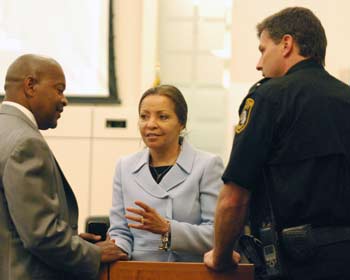
From left: Greg Dill, Washtenaw County’s infrastructure management director; county administrator Verna McDaniel; and Dieter Heren, police services commander.
Dieter Heren, police services commander with the Washtenaw County sheriff’s office, was on hand to accept the resolution on behalf of sheriff Jerry Clayton and all law enforcement agencies in the county. He reminded the board that on May 15 at 10 a.m. there will be a memorial service in the Washtenaw 100 Park in Ypsilanti to “honor the law enforcement officers who have fallen here in Washtenaw County while serving the community,” he said. The park is located at the corner of Michigan Avenue and Ballard Street.
Communications & Commentary: Medicaid Expansion
Andy LaBarre informed his board colleagues that he intends to bring a resolution to the May 15 meeting regarding Medicaid expansion. He said he’d be talking with commissioners individually about his resolution before then. He noted that at a recent meeting of the Area Agency on Aging 1-B, that board approved a resolution in support of Medicaid expansion. [LaBarre serves as the county's liaison to the AAA 1-B board.]
Responding to a follow-up email query from The Chronicle, LaBarre indicated that the resolution he plans to bring forward will state the county’s support for Medicaid expansion, highlighting some of its benefits.
Present: Alicia Ping, Felicia Brabec, Andy LaBarre, Kent Martinez-Kratz, Ronnie Peterson, Yousef Rabhi, Rolland Sizemore Jr., Conan Smith, Dan Smith.
Next regular board meeting: Wednesday, May 15, 2013 at 6:30 p.m. at the county administration building, 220 N. Main St. in Ann Arbor. The ways & means committee meets first, followed immediately by the regular board meeting. [Check Chronicle event listings to confirm date.] (Though the agenda states that the regular board meeting begins at 6:45 p.m., it usually starts much later – times vary depending on what’s on the agenda.) Public commentary is held at the beginning of each meeting, and no advance sign-up is required.
The Chronicle could not survive without regular voluntary subscriptions to support our coverage of public bodies like the Washtenaw County board of commissioners. Click this link for details: Subscribe to The Chronicle. And if you’re already supporting us, please encourage your friends, neighbors and colleagues to help support The Chronicle, too!




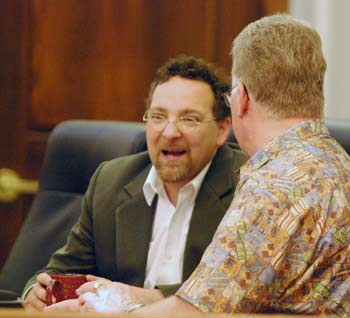
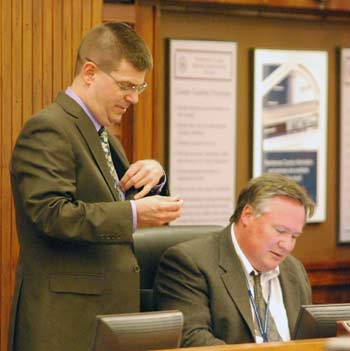
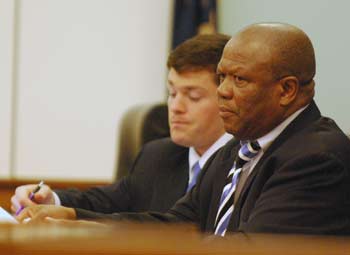
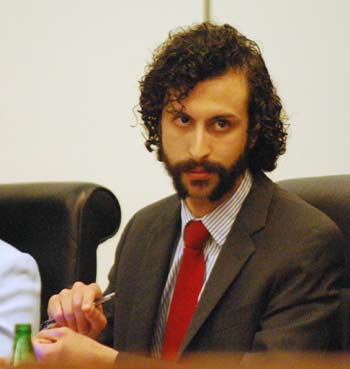
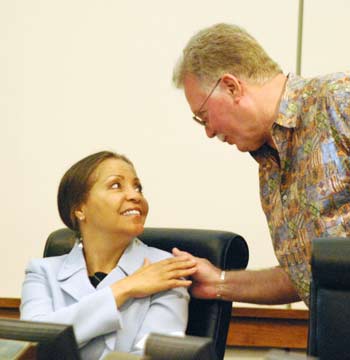
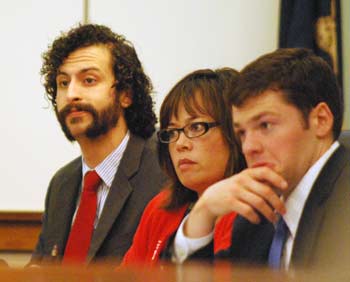
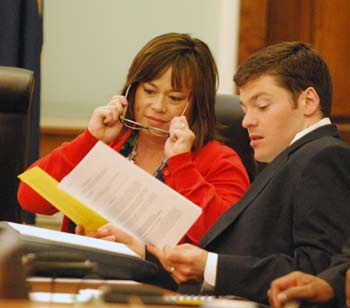
The road question is indeed vexing. It may be that the pre-Headlee law is the most direct way to ameliorate county road conditions. But I’m guessing that it could cause a political firestorm.
I’ve been following the state transportation budget discussions with interest and have discussed some of the issues in my post [link] which also has some helpful links to explanatory documents.
If Governor Snyder’s transportation package goes through (which appears to be extremely unlikely), money would actually be withdrawn from local roads and applied toward “commercial corridors”. Perhaps North Territorial would be one.
One of the aspects of the underfunding of the transportation network is the degree to which townships fail to contribute towards the upkeep of roads. Townships argue that since they don’t receive any Act 51 funds, they shouldn’t be required to contribute any additional funding. But Act 51 doesn’t cover the cost of funding roads in any community. At the County level, the road commission goes without. In the cities and villages, most levy road millages to make up the gap that exists between the need and what is provided through Act 51 funding. Townships should be asked to do the same.
Some townships allocate funds towards roads but there should be a contribution from the townships consistent with what cities and villages do through their local road millages. A countywide millage would probably be most unpopular in the townships but it actually would be the cities and villages that already have voted millages who could argue that it would result in double taxation.
@2: So is the alternative for the CRC to direct resources to roads within those jurisdictions that are paying a portion? Can the county board directly influence such decisions? It seems like there’s at least an opportunity for the board, city/village councils, and county citizens to indirectly influence them. Your description of the situation might help them clearly make the case for appropriate allocations.
@3: Okay, now that I’ve actually read the article (always a good idea) I see that commissioners addressed the township and state funding options.